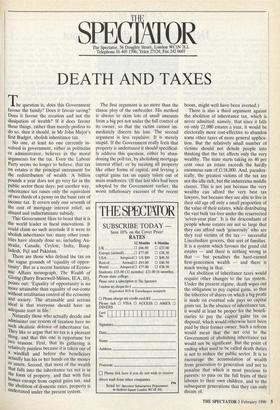SPECT"AT OR
The Spectator, 56 Doughty Street, London WC1N 2LL Telephone 01-405 1706; Telex 27124; Fax 242 0603
DEATH AND TAXES
e question is, does this Government
Th
favour the family? Does it favour saving? Does it favour the creation and not the dissipation of wealth? If it does favour these things, rather than merely profess to do so, then it should, in Mr John Major's first Budget, abolish inheritance tax.
No one, at least no one currently in- volved in government, either as politician Or administrator, believes in the moral arguments for the tax. Even the Labour Party seems no longer to believe, that tax on estates is the principal instrument for the redistribution of wealth. A billion Pounds a year does not go very far in the Public sector these days; put another way, inheritance tax raises only the equivalent of two thirds of a penny on the basic rate of Income tax. It covers only one seventh of the cost of mortgage interest relief, an absurd and indiscriminate subsidy.
This Government likes to boast that it is the world leader in fiscal innovations. It could claim no such accolade if it were to abolish inheritance tax: many other coun- tries have already done so, including Au- stralia, Canada, Ceylon, India, Bang- ladesh, Fiji and Pakistan.
There are those who defend the tax on the vague grounds of 'equality of oppor- tunity'. But as a recent Institute of Econo- mic Affairs monograph, The Wealth of Giving (Barry Bracewell-Milnes, IEA, £6), Points out: 'Equality of opportunity is no more attainable than equality of out-come Without totalitarian control of the economy and society. The attainable and serious ideal is that everyone should have an adequate start in life.'
Naturally those who actually decide and administer our system of taxation have no such idealistic defence of inheritance tax. They like to argue that no tax is a pleasant thing, and that this one is opportune for two reasons. First, that its gathering is relatively painless because it is taken out of a windfall and before the beneficiary actually has his or her hands on the money or assets. Second, that most of the wealth that falls into the inheritance tax net is in the form of property, and that with first homes exempt from capital gains tax, and the abolition of domestic rates, property is undertaxed under the present system.
The first argument is no more than the classic ploy of the embezzler. His method iS always to skim lots of small amounts from a big pot not under the full control of its owner, so that the victim cannot iM- mediately discern his loss. The second argument is less repulsive. It is merely stupid. If the Government really feels that property is undertaxed it should specifidal- ly address this question, either by aban- doning the poll tax, by abolishing mortgage interest relief, or by treating all property like other forms of capital, and levying a capital gains tax on equity taken out of main residences. (If that last idea had been adopted by the Government earlier, the worst inflationary excesses of the recent
boom, might well have been averted.) There is also a third argument against the abolition of inheritance tax, which is never admitted: namely, that since it falls on only 22,000 estates a year, it would be electorally more cost-effective to abandon some other taxes of more general applica- tion. But the relatively small number of victims should not delude people into thinking that the tax affects only the very wealthy. The state starts taking its 40 per cent once an estate exceeds the hardly enormous sum of £118,000. And, paradox- ically, the greatest victims of the tax are not the idle rich, but the industrious middle classes. This is not just because the very wealthy can afford the very best tax lawyers, but because they are able to live in their old age off only a small proportion of the value of their estates, while distributing the vast bulk tax-free under the resurrected 'seven-year plan'. It is the descendants of people whose estates are not so large that they can afford such 'generosity' who are they real victims of the tax — successful Lincolnshire grocers, that sort of families. It is a system which favours the grand old estates — and there is nothing wrong in that — but penalises the hard-earned first-generation, wealth — and there is much wrong in that.
An abolition of inheritance taxes would require other changes to the tax system. Under the present regime, death wipes out the obligation to pay capital gains, so that the inheritor of shares on which a big profit is made on eventual sale pays no capital gains tax. In the absence of inheritance tax, it would at least be proper for the benefi- ciaries to pay the capital gains tax on disposal, which would otherwise have been paid by their former owner. Such a reform would mean that the net cost to the Government of abolishing inheritance tax would not be significant. But the point of ending what used to be called death duties is not to reduce the public sector. It is to encourage the accumulation of wealth from generation to generation and not to penalise that which is most precious to parents: to pass on the full fruits of their labours to their own children, and to the subsequent generations that they can only dream of.


















































 Previous page
Previous page